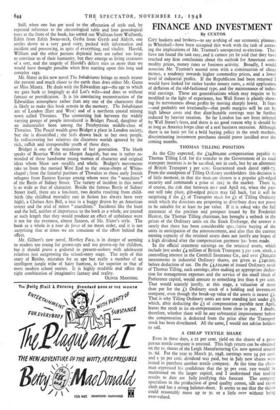FINANCE AND INVESTMENT
By CUSTOS
Czri bankers and brokers—to say nothing of our economic planners in Whitehall—have been occupied this week with the task of assess- ing the implications_of Mr. Truman's unexpected re-election. They have not found the task easy, and it cannot yet be said that they have reached any firm conclusions about the outlook for American com- modity prices, money rates or business activity. Broadly, I would associate Mr. Truman's second term with a continuation of cheap money, a tendency towards higher commodity prices, and a lower level of industrial profits. If the Republicans had been returned I would have looked for rather harder money rates, a mild application of deflation of the old-fashioned type, and the maintenance of indus- trial earnings. These are generalisations which may require to be modified in the light of experience, but Wall Street is plainly show- ing its nervousness about profits by moving sharply lower. It fears —and probably not irrationally—that profit margins will be cut by high labour costs and that distributable earnings may be further reduced by heavier taxation. So far London has not been infected by Wall Street's fears, and there is no good reason why it should be as long as America keeps clear of a real business recession. Although there is no basis yet fol.. a bold buying policy in the stock markets, 'discriminating investment purchases should prove justified over the coming months.
THOMAS TILLING POSITION
As the City expected, the £24,800,000 compensation payable to Thomas Tilling Ltd. for the transfer to the Government of its road transport interests is to be sat.sfied, not in cash, but by an allotment of British Transport 3 per cent. Guaranteed stock dated 1968-73. From the standpoint of Tilling Ordinary stockholders this decision is of little moment, in that the med_um chosen is a popular gilt-edged security and commands a price of toa in the market. There is, of course, the risk that between no .v and April 1st, when the pay- out will take place, gilt-edged prices may fall back, but it will be surprising if the £5 of Transport stock for £r of Tilling Ordinary stock which the directors are proposing to distribute does not prove to be saleable for at least its par value. If it is asked why the full statement of the position and prospect issued by Sir Frederick Heaton, the Thomas Tilling chairman, has brought a setback in the prices of the Ordinary units on the Stock Exchange, the answer is surely that there has been considerable spec2.1ative buying of the units in anticipation of the announcement, and also that the current earning capacity of the retained assets does not justify any hopes of a high dividend after the compensation payment has been made.
In the official statement earnings on the retained assets, which include just under £4 million of British Transport 3 per cent. stock, a controlling interest in the Cornhill Insurance Co., and over £800,000 investments in industrial Ordinary shares, are given Is £240,000, before deduction of tax. On the £4,12o,000 of issued Ordinary stock of Thomas Tilling, such earnings, after making an appropriate deduc- tion for management expenses and the service of the small block of Preference capital, would amount to something less than 6 per cent. That would scarcely justify, at this stage, a valuation of more than par for the £r Ordinary stock of a holding and investment company, even though the break-up value of the assets is nearer £2. That is why Tilling Ordinary units are now standing just under £6, which, after deducting the £5 of compensation payable next April, leaves the stock in its ex-compensation form close to par. I doubt, therefore, whether there will be any substantial improvement before the compensation is deducted from the price after the Transport stock has been distributed. All the same, I would not advise holders to sell.
A CHEAP TEXTILE SHARE
Even in these days, a 12 per cent, yield on the shares of a pros- perous textile company is unusual. This high return can be obtained on the rs. shares of the Leigh Manufacturing Co. now quoted around 2s. 6d. For the year to March 31, 1948, earnings were 54 per cent. and a 3o per cent. dividend was paid, but in July new shares were issued to purchase another textile company. At the time the chair- man expressed his confidence that the 3o per cent. rate would be maintained on the larger capital, and I understand that trading results to date are fully justifying this forecast. The company specialises in the production of good quality cotton, silk and rayon cloth and has a strong balance-sheet. It seems to me that the shares could reasonably move up- to 3s. or a little over without being over-valued.


































 Previous page
Previous page